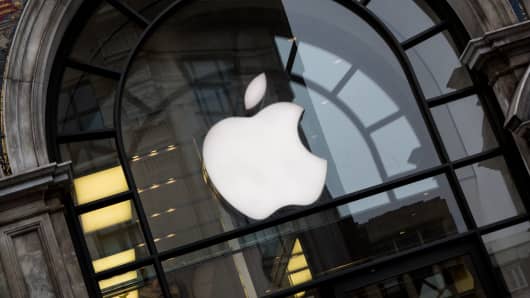Often the gurus in the short bias group will point out that they think Apple faces shrinking margins and that Google's Android based phones are gaining market share. To be fair, Apple may actually come under margin pressure, although last quarter is not a good example of it.
Last quarter, Apple introduced several new products, and as someone who spent years manufacturing and importing products, I know the first quarter or two are the toughest ones from a profit perspective. If Apple launched as many products as they did without a margin hit, they unquestionably would be able to walk on water. Apple can't walk on water, but then again, they don't need to.
(Read More: Apple Rakes in the Most Mobile App Revenue: Study)
Apple doesn't have a margin problem and if margins do shrink they still don't probably have a margin problem. Where else are you going to get a large tech company with Apple's margins? I will save you the trouble; you're not going to find another company with the wide margins Apple enjoys.
To those that say "don't buy Apple, the margins may fall," I reply with a firm, "OK, what offers better profit margins?" A sound of crickets in the background is the only sound heard after asking that straightforward question. I can follow up with "OK, what company offers greater profits than Apple?" (Cue up the crickets again). The fact is until Apple is not producing better than everyone else, they are the leaders.
If you read the book "Jack, Straight From the Gut" like I have, you know that you want to own the leaders in any given space. In other words, if you're not the lead dog, the scenery never changes.
Or as Jack put it and I am paraphrasing, "When the lead company in a space catches a cold, the second and third tier companies catch pneumonia (cue up BlackBerry, Motorola, Hewlett-Packard, Dell and Nokia for your viewing pleasure).
Apple has fallen so far that it has now also become cheap, which is why you're reading about Apple as a value play.
More From TheStreet.com:
Netflix Can't Hold HBO's Jockstrap
Intel: The Ultimate Income-Producing Tech Stock
Fiat-Chrysler's Electric Car Gamble: First Drive
Compared to its peers, Apple is cheap. I'm not a big fan of removing cash and calculating the price to earnings multiple, but since that metric is used so often, I thought you may want to see what it actually looks like against others.
I don't believe it's a fair comparison to include Dell but I wanted to demonstrate how far one must reach to find another tech company with a P/E less cash metric cheaper than Apple. It's not fair because Apple's total size is more than 10 times greater than Dell.
What do I believe is in store for Apple? I believe Apple, one of the most talked about companies in the world, is about to become "discovered again" before the end of 2013. Apple will use its war chest of cash and buy shares, and buy a lot. That will just get the engine running.
After reporting one or two more solid quarters, fund money will again flow into Apple, which not only retards the selloff but turns the media around to the bullish thesis again. Fund managers won't have much of a choice, and they won't want another choice. Apple pays a 2.5 percent yield with a forward payout ratio less than 12 percent. Once you remove the declining margin issue, which I think Apple will, you remove any reason why large funds won't want to increase their exposure.
We can expect margins to increase because energy prices are falling. As long as oil continues to fall, the cost of production and distribution of Apple's products will remain favorable. Lower energy prices also mean that consumers will have more disposable income, and that is what will continue to keep demand high for Apple products.
To be sure, Apple can fall further, but unless there is a significant negative shift against Apple in the space that no one can predict, Apple's margins should improve, not deteriorate. Buy Apple now, or you will likely have to buy at a higher price in the near future.


